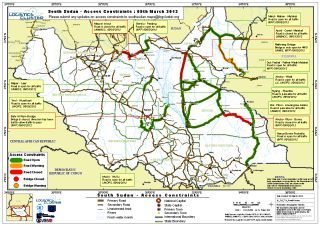South Sudan refocuses on roads network as a priority
May 1, 2013 (JUBA) – South Sudan’s government has prioritized construction of several economic and security roads and bridges in the country, which eight years after a peace deal ended decades of civil and almost two years after independence from Sudan is still barely connected with itself.

These include a network of major international trunk roads that connect to all the neighbouring countries as well as inter-state roads connecting all corners of the country to the capital, Juba.
A number of major bridges will also be built across the River Nile in Juba, Bor or Ramciel and Malakal in addition to another bridge to be built across the Sobat River in eastern part of Upper Nile state.
The following is the breakdown of the priority roads that should be tarmacked:
- Juba-Terekeka-Awerial-Ramciel-Yirol-Rumbek-Mayendit-Bentiu-Jau plus Yirol junction-Shambe-Leer
- Juba-Bor-Canal Mouth-Malakal-Renk
- Nadapal-Kapoeta-Torit-Juba
- Juba-Mundri-Maridi-Yambio-Tambura
- Paloch-Longochok-Mathiang-Maiwut-Pagak
- Rumbek-Wau-Kwajok-Gogrial-Abyei-Wau-Aweil
- Juba-Yei-Kaya-
- Bor-Pibor-Okello-Pochall plus Ayod-Waat-Akobo
- Malakal-Nasir-Jikou
- Tambura-Wau-Raja-Boro Medina
- Kapoeta-Kessingor-Boma-Raad
The roads projects are estimated to cost over $10 billion over 10 years, according to the ministry of roads and bridges.
South Sudan is still suffering from austerity measures introduced over a year ago as a result of a transit fee dispute with Sudan over how much Juba was willing to pay to export its oil through its northern neighbour.
Oil production resumed last month after a deal was reached with Khartoum but the cuts have still not been rescinded.
The ministry of roads and bridges was allocated less than $100 million last year far less than what is required to fulfill the infrastructure plans.
Due to these budget limitations, the government will seek finances including securing loans from foreign financial institutions in order to implement the plan.
(ST)
